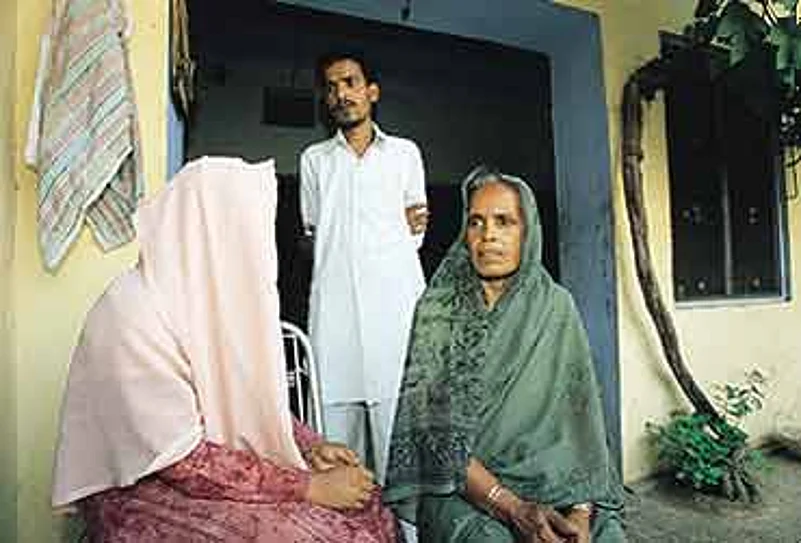Relatives of the victims suffer in silence. But Sumitra is not whispering her sorrow. She lashes out at us: "Where were you when they conspired to kill my girl? You have now come to reopen my wounds. They did not kill their son, but I will kill him." Everyone in Bhaini Mato village near Meham knows why Sumitra’s daughter Urmila had to die. Last November, she eloped with Jasbir, her classmate in the polytechnic from the neighbouring village. The ill-fated couple didn’t anticipate the opposition to their marriage.
Urmila and Jasbir were unaware that for generations there existed a mutual ‘filial’ bond between their two villages. In fact, all men and women are considered blood relatives and hence cannot intermarry. Urmila and Jasbir committed this fatal sin. They were apprehended, brought before the khap panchayat—an unofficial panchayat prevalent among the different Jat subcaste lineages which passes judgement and awards punishments. It decreed that both would have to die to restore the brotherhood. A few days later, Urmila died mysteriously. Many say she was forced to commit suicide. Jasbir and his family fled their village.
There is a conspiratorial silence in the two villages. Even at the Meham police station, no one is prepared to discuss Urmila’s death. "Yes, we heard that she died but since we didn’t receive any complaint, we cannot take action against anyone," says a police official. Admits Sharad Kumar, Inspector General of Police, Rohtak range: "These panchayats are strong social entities with political links. We really cannot do much because very often there is no complaint. And even if we do file a chargesheet, the case falls flat in the absence of witnesses."
Urmila and Jasbir’s case is not an isolated one. "Khap panchayats have been acting like serial killers," says Dr D.R. Chaudhary, a former college principal who has researched the judicial system. Khap panchayats are primarily a Jat phenomenon of medieval vintage. Despite elected village panchayats, this age-old institution continues to assert its hold over society. A khap is generally a cluster of villages dominated by a particular gotra (subcaste) of Jats. Jats of the same subcaste belong to the same khap and marriages between them are a taboo.
Honour killings or other khap-approved atrocities such as social boycotts have become the order of the day in the Jat belt in Haryana, western UP and Rajasthan. Some see its revival as the emergence of a parallel judicial system which nobody seems to be questioning.
The spate of injustice continues. Take the case of Singh Ram Kadiyan of Charkhi village in Bhiwani district. His son Leela Ram had raped and murdered Sunita Sangwan from the same village. He was subsequently arrested and is fighting a court case. But the Sangwan khap decreed that the entire family must suffer. They were expelled from the village. The family which had lived there for the last seven generations had to leave their 25 acres and take shelter with relatives. Last August, Singh Ram’s younger son Ranbir returned to the village for a day. He was found strangled the next morning, apparently a retribution for defying the khap’s diktat. Singh Ram did not even complain to the police because he considered it a futile exercise.

Dr Anant Kaur and her husband were forced to leave the village at the instance of a khap panchayat. Their clinic and house was burnt down by a khap-incited mob while the police looked on.
In fact, so powerful are the khaps that they are able to flout court orders and even influence the police. Dr Sumer Sangwan and his wife Dr Anant Kaur of Bhadhra village in Bhiwani district were allegedly framed in a false case. Their clinic and house was burnt by a khap-inspired crowd while the police looked on. This, despite a high court order directing the district police to provide protection.The general secretary of the Sheoran khap, Dharampal Sheoran, who also happens to be the Bhiwani district president of the BJP, justifies his khap’s action. "We took action because the Sangwans challenged us by going to court. If they had asked us for forgiveness, things would have been different."

Irshad Elahi, father of Dr Naaz Parveen. Her choice of groom violated caste ‘norms’; her brother allegedly killed her and her husband. Elahi supposedly gave his ‘assent’, but he denies it.
In Muzaffarnagar district of UP, adjoining Haryana, 13 such killings took place till last September. Here honour killings and atrocities are prevalent among Jats as well as Muslims. The Muslims have a well-entrenched caste system which operates in a similar manner. Dr Naaz Parveen and her husband Kashiv Jamal were hacked to death in a busy Muzaffarnagar lane, allegedly by Naaz’s brother Nazir. The crime? Their marriage violated caste norms. Nazir was acquitted because no one came forward to testify. Naaz’s father, who is widely believed to have plotted his daughter’s murder, told Outlook: "I was facing pressure from my community. They wanted me to permit them to eliminate the two." But he denies having a hand in the killing of his daughter. "I don’t know who killed Naaz. The matter has now been cleared and our honour restored."

Anita’s family remains shattered. Her brother eloped with a woman of the village. As revenge, five cousins of the woman, acting on the diktat of her mother and aunt, raped Anita.
In Baseda village of Muzaffarnagar, 15-year-old Anita (name changed) was raped last October to take revenge on her family. Her brother Sonu had eloped with Roshan Jahan of the same village. Jahan’s mother and aunt allegedly plotted the revenge. The deed was done by Jahan’s cousins.
Such horrific tales abound. So long as the khaps are allowed a free hand, they will continue to ‘guide’ community life via such inhuman means.


























